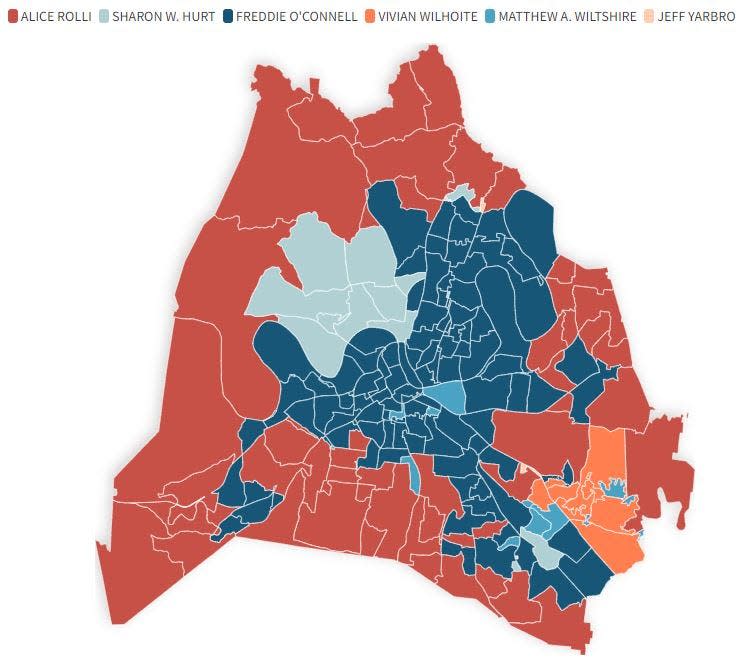Nashville mayoral race: How election maps could foreshadow runoff results

Mayoral candidates Freddie O'Connell and Alice Rolli will compete for Nashville's top seat in a runoff election on Sept. 14.
O'Connell won 27% of the votes cast for mayor in the Aug. 3 general election, and Rolli took home 20%.
Here's what those votes, and where they came from, tell us ahead of the runoff election.
Mayoral vote winners by precinct
O'Connell received the most votes in 97 of Metro's 179 voting precincts, particularly in Nashville's core, East Nashville and portions of Southeast Nashville.
O'Connell-won precincts largely correlate to Davidson County's most populated districts.
Downtown Nashville (which O'Connell represented as a district council member for the last eight years) grew nearly 58% from 2010 to 2020, according to the 2020 census. East Nashville and Southeast Nashville have also seen population increases over the last decade.
Districts in North Nashville (where At-large Council member Sharon Hurt topped vote totals in multiple precincts) and South Nashville have the highest percentage of minority residents, according to census data. West Nashville has the lowest percentage.
Rolli brought in the most votes in 50 precincts, mostly located along the edges of the county — areas that have historically netted support for candidates with conservative policy views.
Importantly, number of precincts won does not reflect the overall vote total.
Matt Wiltshire finished the general election in third place with nearly 17% of the vote, but received the most votes of any candidate in just nine precincts.
State Sens. Jeff Yarbro and Heidi Campbell took fourth and fifth place, respectively. Yarbro netted 12% of the vote, topping the vote in three precincts. Campbell, with just over 8% of the vote, did not win the most votes in any precinct.
Wiltshire, Yarbro and Campbell have endorsed O'Connell in the runoff election.
O'Connell vs. Rolli: Concentrations of support
O'Connell saw support from 25% or more precinct voters in 87 of Metro's 179 precincts.
Rolli saw support from 25% or more precinct voters in 53 Metro precincts.
O'Connell received his highest per-precinct vote totals in East Nashville, near Belmont and in the Sylvan Park neighborhood.
Rolli's highest vote totals came from the Hillsboro area, Brentwood, West Meade/Belle Meade and some neighborhoods in Hermitage and Joelton.
Voter turnout
The Davidson County Election Commission tallied 101,746 votes in the Aug. 3 mayoral race, totaling 20.4% of the county's active registered voters.
Metro general elections over the last 20 years generated an average 24.2% voter turnout.
The O'Connell-Rolli matchup mirrors the 2015 race between Megan Barry and David Fox (who now serves as Rolli's treasurer and campaign manager). The race is nonpartisan, but O'Connell's policy positions, like Barry's, lean progressive. Rolli and Fox share more conservative platforms.
The 2015 general election brought in 104,343 ballots and sent Barry and Fox to a runoff, separated by less than one percentage point. A total 110,582 voters cast a ballot in the Barry vs. Fox runoff, of the 374,209 voters registered at the time. Barry claimed the seat with nearly 55% of the vote.
O'Connell secured 27% of the vote on Aug. 3 compared to Rolli's 20%, giving him an edge in the runoff.
Precinct 18-3 in Belmont, where O'Connell received his highest number of votes in a single precinct, also had the highest voter turnout overall.
Support for Rolli aligns with several precincts with the highest turnouts, including in Brentwood, Hillsboro and West Meade.
This article originally appeared on Nashville Tennessean: Nashville mayor's race: What election maps tell us about the runoff

